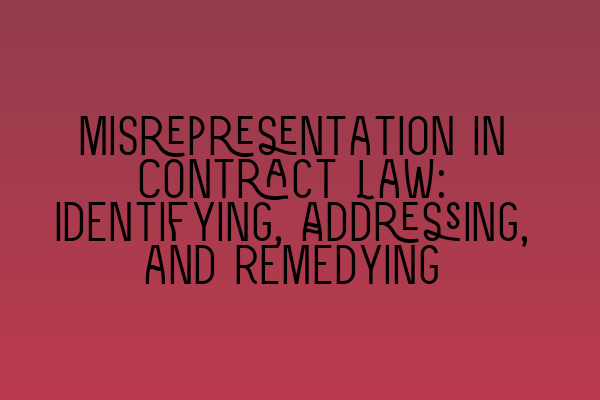Misrepresentation in Contract Law: Identifying, Addressing, and Remedying
Welcome to SQE Contract Law! As solicitors, it is our duty to ensure that contracts are entered into with full knowledge and understanding of the terms and conditions. However, there are instances when one party may misrepresent facts, leading to a breach of contract. In this blog post, we will explore the concept of misrepresentation in contract law, helping you identify, address, and remedy this issue.
What is Misrepresentation?
Misrepresentation occurs when one party makes a false statement of fact to another party, inducing them to enter into a contract. This misrepresentation can be made either intentionally or innocently, but regardless of the intent, it can have significant consequences for the parties involved. The misrepresentation may be made through oral statements, written statements, or even through conduct.
Identifying Misrepresentation
Identifying misrepresentation is crucial in contract law, as it determines the legal implications that follow. There are three main types of misrepresentation: fraudulent misrepresentation, negligent misrepresentation, and innocent misrepresentation.
1. Fraudulent Misrepresentation:
Fraudulent misrepresentation occurs when one party makes a false statement with the intention of deceiving the other party. This type of misrepresentation is considered the most serious and can result in the contract being voidable, meaning the innocent party has the right to rescind the contract and seek damages.
2. Negligent Misrepresentation:
Negligent misrepresentation occurs when a party makes a false statement without knowing it is untrue or without reasonable grounds for believing it to be true. Although there is no fraudulent intent, the innocent party may still have the right to rescind the contract and claim damages.
3. Innocent Misrepresentation:
Innocent misrepresentation occurs when a party makes a false statement honestly and without any knowledge that it is untrue. In this case, the innocent party may only have the right to rescind the contract, but not to claim damages.
Addressing Misrepresentation
If you suspect misrepresentation in a contract, it is important to act promptly to protect your interests. Here are the steps to address misrepresentation:
1. Gather Evidence:
Collect any evidence that supports your claim of misrepresentation. This can include emails, letters, or any other documentation that proves the false statement made by the other party.
2. Consult a Solicitor:
Seek legal advice from a solicitor experienced in contract law. They will review the evidence and guide you on the best course of action.
3. Communication:
Notify the other party of the misrepresentation and express your intention to rescind the contract. Clearly state your desired remedy, whether it is the return of any payments made or compensation for any losses suffered.
4. Negotiation and Mediation:
Attempt to resolve the issue through negotiation and mediation. This can save time, costs, and maintain a professional relationship between the parties.
5. Legal Remedies:
If negotiation fails, you may need to pursue legal remedies. Your solicitor will advise you on the best course of action, which may include filing a lawsuit to seek damages or the voiding of the contract.
Remedying Misrepresentation
To remedy the effects of misrepresentation, the court may grant several remedies based on the circumstances of the case. These remedies aim to restore the parties to their pre-contractual position or provide compensation for any losses suffered. The most common remedies include:
1. Rescission:
Rescission allows the innocent party to cancel the contract and return to their original position before entering into the agreement. This includes returning any payments made and reversing any actions taken under the contract.
2. Damages:
The court may award damages to compensate the innocent party for any losses suffered due to the misrepresentation. The damages aim to put the innocent party in the position they would have been in had the misrepresentation not occurred.
Conclusion
Misrepresentation in contract law can have significant consequences for both parties involved. It is essential to identify and address misrepresentation promptly to protect your rights. Consulting a solicitor experienced in contract law is crucial to ensure you take the appropriate legal steps and seek the remedies you deserve.
If you found this blog post helpful, you may also be interested in these related articles:
– Unveiling Real-Life Case Studies: Insights into Legal Practice and Decision-Making
– Exploring Solicitor Salaries in the UK: Average Earnings and Factors Affecting Income
– Mastering Client Relationship Management: Skills for Solicitors to Enhance Trust and Loyalty
– Pursuing a Law School Education in the UK: Choosing the Right Path for Your Future
– Securing Training Contracts: A Roadmap to Becoming a Solicitor
Remember, when it comes to misrepresentation in contract law, knowledge is power. Stay informed, protect your rights, and seek professional advice when necessary.
